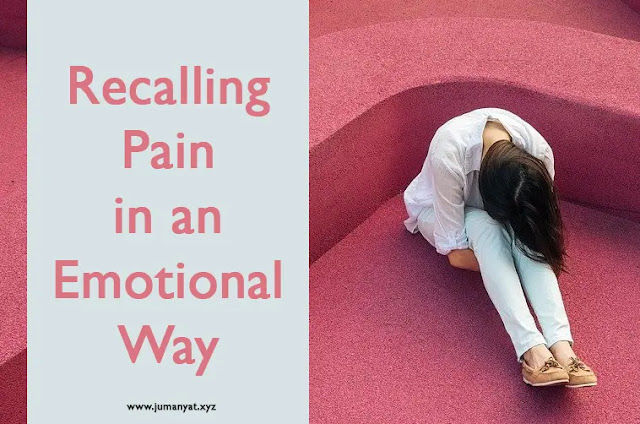I remember traumatic moments from my childhood and early teen years extremely vividly. I remember my mom telling me that my grandfather had cancer. I remember the pain I felt when one of my closest friends moved away for college. I remember how I felt when I broke off my first relationship. I remember it all.
But I don’t remember what a sore throat feels like when I have a cold. I don’t really recall the pain I felt when I fell off my bike when I was eight and violently scraped my knee. I don’t remember the pain of my twisted ankle when I tripped on the soccer field when I was fourteen. The memories seem to escape me.
Do I have a bad memory? Was the pain bad enough that I mentally blocked it somehow? And were the emotionally painful moments that much worse than the physically painful moments?
No.
Three separate universities in different parts of the world did a study on this odd phenomenon. In their study, the researchers asked students to write the account of the traumatic events. They were asked a series of questions about the physical pain that occurred as well as the emotional pain that accompanied the events. All the events that they were asked to recall had taken place in the last five years. The researchers discovered that the students remembered the emotional pain as being more painful and vivid, while the physical pain was more toned down and less intense.
Why?
Guy Winch wrote a book called, “The Squeaky Wheel,” which deals with improving your self-esteem, creating healthy relationships, and protecting your psychological health. In his book, he wrote
five reasons why emotional pain is worse than physical pain.
1. Memories trigger emotional pain, not physical pain.
He uses a broken leg and a broken relationship as an example. Recalling the time you broke your leg won’t make your leg hurt, whilst remembering a broken relationship will cause you significant emotional pain. This event is caused by other things such as that fact that…..
2. We use physical pain as a distraction from emotional pain, but not the other way around.
Some people use dangerous outlets of emotional pain, such as cutting, burning, and other physical forms of release. For many people, this makes them feel better. The physical pain helps distract from the pain they’re feeling inside. However, this doesn’t happen the other way around. For instance, if you had a route canal and your mouth is killing you, you won’t reread a rejection letter from a college or from an old significant other. While physical pain might help temporarily relieve emotional pain, emotional pain can’t do the same for physical pain However, while we might prefer physical pain to emotional pain, others see our pain in a different way as evidenced by the fact that….
3. Physical pain garners more empathy from others than emotional pain.
If you see someone get knocked in the head with a branch or a pole, you’ll most likely panic and go see if they’re alright. However, if you see someone getting verbally abused or bullied, you might just walk away or watch without doing anything or feeling much. To you, emotional pain is worse and hurts a heck of a lot more, but to others, the physical pain looks a whole lot worse. Studies show that we constantly underestimate others’ emotional pain compared to their physical pain.
4. Emotional pain echoes in ways that physical pain does not.
When I was ten, I loved pecan pie like nobody’s business. I adored the stuff. However, on New Years, we had pecan pie for dessert and I contracted the stomach flu a few hours later. The trauma of being sick after having my favorite dessert ruined my love for the pie forever. Even the smell of the pie makes me gag. I can’t enjoy it anymore and I don’t think I ever will. Emotional pain is a lot like that experience. If you get a call about a loved landing in the hospital after a car accident or other incident, while enjoying a favorite movie, you may never enjoy that movie again. The emotional pain or shock you experienced while doing that activity will ruin it for years. That movie or activity will constantly bring up the pain you felt while participating in it.
5. Emotional pain but not physical pain can damage our self-esteem and long-term mental health.
Breaking your leg skiing won’t emotionally scar your for the rest of your life unless the actual event was emotionally painful. But being bullied as a child can emotionally scar you for a long time. It can damage your self-esteem and cause you to be extremely self-conscious about a particular feature that was the pinpoint of bullying. Long-term effects are often the case with emotional trauma as a child or teen, or even adult.
However, there are some exceptions to this. Physical pain, such as falling off a horse and breaking an ankle, can cause people to be wary about doing the activity again. If the horse bucked and freaked out, the shock of it can cause emotional pain, causing one to refuse to trust horses again, but this is not always the case. Physical pain can cause one to be wary of many things.
Have you seen this phenomenon echo in your own life? If so, what happened?

Comments
Post a Comment